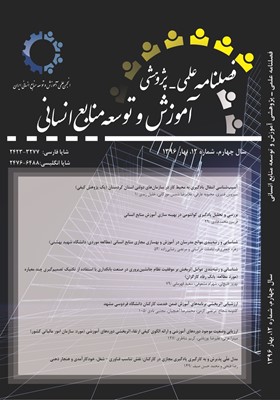بازنمایی موانع و چالشهای رشد و بالندگی اعضای هیئت علمی جدیدالاستخدام: مطالعهای به روش پدیدارشناسی
محورهای موضوعی :
1 - دانشگاه کردستان
2 - دانشکده روانشناسی و علوم تربیتی
کلید واژه: رشد و بالندگی, سلامت روانی, اعضای هیئت علمی جدیدالاستخدام, پدیدارشناسی.,
چکیده مقاله :
از مهم ترین راهبردهای توسعه پایدار در دانشگاههای ارزش آفرین و پیشگام در عرصه خلق دانش و فناوری، بسترسازی برای فعالیت بهینه اعضای هیئت علمی است. در پژوهش حاضر، سعیشد چالش ها و موانع رشد و بالندگی اعضای هیئت علمي جدیدالاستخدام در دانشگاههای دولتی شهر تهران مورد مطالعه قرار گیرد. بدینمنظور از نمونهگیری هدفمند، از نوع ملاکی استفاده شد که پس از مصاحبه یازدهم، اشباع نظري دادهها حاصل گردید، اما در راستای اعتباربخشی به یافته ها، مصاحبه ها تا پانزدهمین نفر ادامه یافت. دادهها با استفاده از فن مصاحبه نیمهساختاریافته و در سه شیوه "حضوری"، "تلفنی" و "مکتوب" جمعآوري شده و مبتنی بر راهبرد هفت مرحلهای کُلایزی، تحلیل گردید. نتایج پژوهش، به شناسایی چالشها در دو بخش عمده «رشد و بالندگی» و «سلامت روانی» منتج گردید. چالشهای رشد و بالندگی شامل مقوله های: «حقوق و مزایای ناچیز در قبال حجم سنگین کار»؛ «ابهام در قوانین ارتقاء و نبود اطلاعرسانی کافی»؛ «ارایه نشدن خدمات لازم برای انجام وظایف سازمانی»؛ «مشکل فضا و مدیریت نامناسب آن»؛ «نبود مهد و شیرخوارگاه برای نگهداری فرزندان اساتید» است. در خصوص سلامت روانی، سه چالش عمده شامل: «فرسودگی شغلی بهدلیل حجم زیاد دروس ارائهشده»؛ «دغدغه عقد قرارداد طرح های پژوهشی با سازمانها»؛ «تحت فشار بودن برای چاپ مقاله نمایه شده در WOS برای تمدید قرارداد دو ساله»، شناسایی گردید. يافتهها نشان داد که اعضای هیئت علمی، با چالشهای متعدد و متفاوتي مواجهاند که استمرار آنها زمینه افت بهرهوری، تعهد، سلامتی و نشاط و پویایی ایشان را فراهم آورده و میتواند در سطوح، فردی، تیمی، سازمانی و اجتماعی، چالشها و آسیبهاي مضاعفي را بههمراه داشته باشد.
The most important sustainable development strategies in pioneer and top universities in the field of knowledge production is contriving for optimal activity of newly-hired faculty members. For this purpose, the present research attempted to study the challenges and barriers of growth and empowerment of newly-hired faculty members. A qualitative approach with phenomenological method was applied to conduct this research and state universities of Tehran were considered as the research environment. There was an attempt to interview the subjects who have necessary experience and understanding of the concept of the phenomenon under study and have necessary awareness of shortcomings and challenges of the research topics. Thus, sampling was conducted purposively of ccriterion type that after the eleventh interview theoretical saturation was achieved, however, for accreditation to the findings, interviews were continued until the fifteenth person. Interviews were carried out through forms of "in person", "by telephone" and "Letter”. Data were collected through semi-structured interviews technique and were analyzed with open and axial coding method. The results identified two factors of growth, empowerment, and mental health in faculty members. The challenges of growth and empowerment were categorized as: Lack of transparency and notification for promotion; absence of kindergartens and nursery care for masters and staffs’ children; not providing appropriate services; space problems and improper management of space and poor support management; high-volume work with indecent benefits and advantages. On the subject of mental health, three categories were recognized: burnout due to high volume of presented modules; concern of contracting for research projects with organizations and being under pressure to publish an ISI article for 2-year contract extension.
